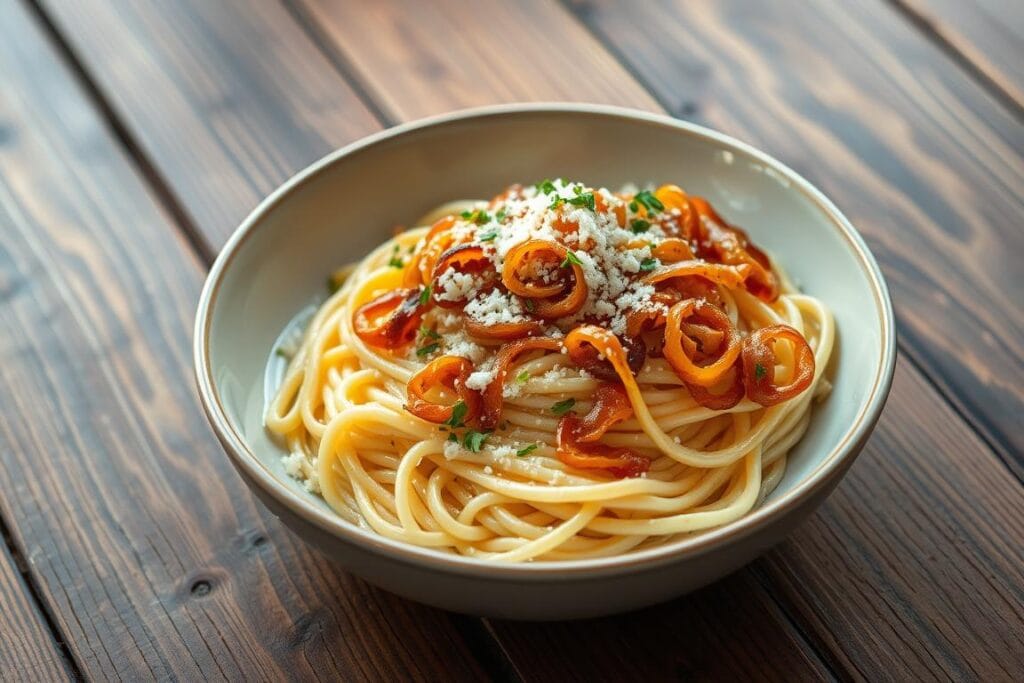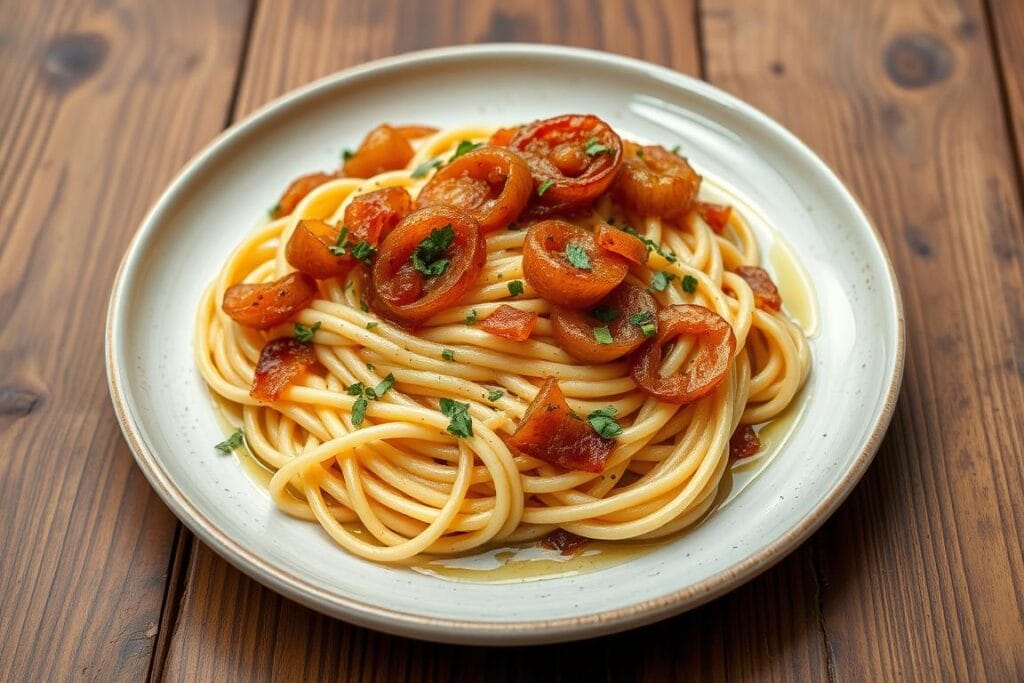Imagine a dish that mixes the richness of caramelized onions with homemade pasta. It’s an easy recipe perfect for any time. Caramelized onion pasta is rich and savory, with deep, sweet flavors that make you want more. Making this dish is easy and fun, from start to finish.
This pasta is great for any meal, whether you’re looking for comfort or something quick. You’ll learn how to make caramelized onion pasta. We’ll cover the ingredients and techniques for perfect caramelization. Plus, we’ll explore more easy pasta recipes.
The Art of Caramelized Onion Pasta
Exploring caramelized onion pasta reveals a dish that’s both comforting and flavorful. The secret lies in the caramelized onion recipe, which demands patience and focus. With over 20.6 million views, it’s clear this dish has won many hearts.
To make a standout pasta with caramelized onions, knowing the history and benefits is key. Caramelized onions bring a rich flavor and a touch of sweetness. The 40-minute caramelization process is worth it for the final taste.
History of This Classic Dish
The roots of caramelized onion pasta lie in traditional Italian cuisine. Onions were slowly cooked to enhance their sweetness. This method has been cherished for generations, now a favorite in Italian restaurants.
Why Caramelized Onions Make Pasta Better
Caramelized onions add a savory flavor that pairs well with pasta. Their sweetness balances the pasta’s saltiness, creating a perfect taste. Whether using a simple or complex recipe, the outcome is always tasty.

Understanding the Caramelization Process
Mastering the caramelization process is essential for perfect onions. Cook the onions slowly over medium heat, stirring occasionally, until they turn golden brown. This takes about 30 minutes. With practice, you’ll create a dish that wows everyone.
| Ingredient | Quantity |
|---|---|
| Onions | 1.75 pounds (4 medium yellow onions) |
| Apples | 1 pound (2 medium Granny Smith or Honeycrisp apples) |
| Garlic | 4 cloves |
| Olive oil | 2 tablespoons |
| Unsalted butter | 4 tablespoons (1/2 stick) |
Essential Ingredients for Perfect Caramelized Onion Pasta
To make a tasty caramelized onion pasta, you need a few key ingredients. You’ll need onions, garlic, olive oil, and parmesan cheese. The quality of these ingredients really matters for the flavor of your dish.
For a vegetarian pasta, you can add other veggies like mushrooms, bell peppers, or zucchini. They add texture and flavor.
Yellow or sweet onions work well for caramelized onion pasta. Yellow onions are a favorite because they get sweeter when cooked. To caramelize the onions, heat 1 tablespoon of olive oil in a pan over low heat. Cook for 40 minutes, stirring now and then. You can also add 1 cup of pasta cooking water to make a sauce.

- 3 onions, thinly sliced
- 2 cloves of garlic, minced
- 1 cup of reserved pasta cooking water
- 1/4 package of Boursin Cheese (30 grams)
- 1 tablespoon of olive oil
These ingredients will help you make a delicious and flavorful caramelized onion pasta. It’s perfect for a vegetarian meal.
The secret to great caramelized onion pasta is using top-notch ingredients. Also, cook the onions slowly over low heat. With these ingredients and a bit of patience, you’ll make a meal that everyone will love.
Choosing the Right Onions for Caramelization
Choosing the right onion is key for caramelizing. Yellow onions and sweet onions are top picks. Yellow onions add a strong flavor, while sweet onions are milder and sweeter.
Butter or oil? Both have their fans. Butter adds a rich flavor, while oil is lighter and has a higher smoke point. Mixing both can enhance your dish’s taste.
Yellow Onions vs. Sweet Onions
Yellow onions are great for caramelizing because they’re high in water. This creates a deep, rich flavor. Sweet onions, with their lower water content, are better for milder flavors.
Red Onions and Shallots as Alternatives
Red onions and shallots are also good for caramelizing. They add color and unique flavors. Red onions are sweeter, while shallots are more delicate.
Quantity and Storage Tips
Use a large amount of onions for caramelizing, about 2 to 3 for a big skillet. Store leftovers in an airtight container in the fridge for up to 4 days. Cook them over medium heat, then lower it to medium-low or low for 45 minutes to 1 hour. This will make them deep golden brown and caramelized.
Mastering the Caramelization Technique
To find out what is the trick to caramelizing onions, you need patience and control over heat. It’s an art that requires careful attention and a gentle touch. The whole process can take 30 minutes to an hour.
It’s important to stir the onions every 2 to 3 minutes. This ensures they caramelize evenly. The onions should be 2-3 mm thick, and the heat should be around 365°F (185°C).
Yellow onions are the best for caramelizing because they are naturally sweet. Some recipes might add a pinch of sugar to make them sweeter, even with less sweet onions.
- Use a thick-bottomed skillet or heavy non-stick pan to prevent uneven heating.
- Stir the onions regularly to prevent burning and promote even caramelization.
- Don’t be afraid to add a small amount of water, broth, or cooking wine to deglaze the pan and add depth of flavor.
By following these tips, you’ll get better at caramelizing onions. The key is patience and controlling the heat. The goal is to turn the onions from pale to a deep, almost chocolatey brown. This can make many dishes, like French onion soup or Indian biryanis, taste better.
Step-by-Step Recipe for Classic Caramelized Onion Pasta
To make a tasty pasta with caramelized onion and garlic, start by getting your ingredients ready. This recipe takes some time, but it’s worth it. First, slice 1.5 pounds of yellow onions into ¼ inch thick slices. You can use one big onion or a few smaller ones, as you like.
Cooking the onions is key in this recipe. Melt 10 to 12 tablespoons of unsalted butter in a pan over medium-high heat. Add the sliced onions and cook for about 10 minutes, stirring often to avoid burning. Then, lower the heat to medium-low and keep cooking for 25-30 minutes, until they’re golden brown.
While the onions cook, prepare the pasta. Cook ¾ pound of pasta until it’s al dente. Before draining, save 1 cup of pasta water. To make the sauce, mix 1 minute of cooked garlic with the onions, then add 80 grams of butter and 70 grams of grated Parmesan cheese. Combine the sauce with the pasta, adding pasta water if needed to get the right consistency.
Some tips for this easy pasta recipe include using top-notch ingredients, like fresh Parmesan cheese. Also, don’t overcook the pasta. You can make it your own by adding other ingredients, like cooked veggies or protein. Follow these steps to make a delicious pasta with caramelized onion and garlic that will wow your family and friends.
Flavor Variations and Add-ins
Want to make your savory pasta dish even better? Try adding different flavors and ingredients. A tasty caramelized onion pasta can get a boost from herbs, spices, proteins, and veggies.
For a unique taste, mix in fresh or dried herbs like thyme or rosemary with the onions. Spices like red pepper flakes or chili powder can add a spicy twist.
Herbs and Spices
Herbs and spices offer endless options. Add some chopped parsley or basil for a fresh taste. Or, use dried herbs like oregano or bay leaves for a milder flavor.
Protein Options
For a fuller meal, add protein to your pasta. Grilled chicken or shrimp are great choices. Crispy bacon or pancetta also work well. For a plant-based option, try tofu or tempeh.
Vegetarian Enhancements
Vegetarian options can also elevate your dish. Roasted veggies like mushrooms, bell peppers, or zucchini add sweetness and texture. A sprinkle of nutritional yeast gives a cheesy, nutty taste.
Wine Pairing and Serving Suggestions
When pairing wine with caramelized onion pasta, think about what goes well with caramelized onions. A dry white wine is a great choice. It matches the sweet and savory tastes of the dish. Pinot Grigio, Verdicchio, and Muscadet are good options.
A medium-bodied, fruity red wine like Gamay or Rioja also works well. It adds richness without overpowering the dish. If you prefer white, a dry Riesling can balance the pasta’s richness. The goal is to find a wine that balances acidity and sweetness.
- White wine: Pinot Grigio, Verdicchio, Muscadet
- Red wine: Gamay, Rioja
- Dry Riesling: for a crisp and refreshing pairing
The right wine choice depends on your taste. Think about your pasta’s flavors and pick a wine that complements them. With some trial and error, you’ll find the ideal match for your meal.
Wine pairing is an art that requires a sense of adventure and a willingness to try new things. Don’t be afraid to experiment and find the perfect pairing for your caramelized onion pasta.
Storing and Reheating Your Pasta Creation
After making your homemade pasta dish, it’s key to store and reheat it right. This keeps the taste and texture just right. For a simple dish like caramelized onion pasta, keep it in an airtight container in the fridge for up to 3 days.
To reheat, use the microwave or stovetop. It takes about 1-2 minutes in the microwave for a single serving. On the stovetop, it’s 3-4 minutes. Adding a bit of water helps keep the pasta moist.
Storage Guidelines
Before refrigerating your pasta, let it cool down to room temperature. This stops bacteria growth and keeps it fresh. You can also freeze it for up to 2 months. Just thaw it before reheating.
Reheating Methods
Reheating your pasta is simple. You can use the microwave, stovetop, or oven. Here are some tips:
- Use a little water to prevent the pasta from drying out
- Stir the pasta occasionally while reheating to prevent it from sticking together
- Use a low heat setting to prevent the pasta from burning or overcooking
Make-Ahead Tips
Preparing your pasta ahead of time saves time. You can make it a day before and store it in the fridge. Here are some tips:
| Make-Ahead Tip | Description |
|---|---|
| Prepare pasta up to a day in advance | Store pasta in the refrigerator until you’re ready to reheat it |
| Use airtight containers | Keep pasta fresh and prevent it from drying out |
| Label and date containers | Keep track of how long your pasta has been stored |
By following these tips, you can enjoy your homemade pasta for days. Whether it’s a simple recipe or a complex dish, proper storage and reheating are key. They ensure your pasta stays delicious and fresh.
Conclusion
Caramelized onion pasta is a savory and comforting dish. It turns simple pasta into a delightful culinary experience. By mastering caramelizing onions, you unlock a world of flavors that blend well with pasta and other ingredients.
Whether you choose a classic savory pasta dish or try new flavors, this delicious caramelized onion pasta recipe will be a favorite. The secret to perfect caramelization is patience and cooking slowly. This ensures the onions are sweet and slightly charred.
Keep improving your skills and explore the many ways to enjoy this dish. Try different pasta, proteins, and herbs to make it your own. The possibilities are endless, allowing you to create a caramelized onion pasta that you love.

